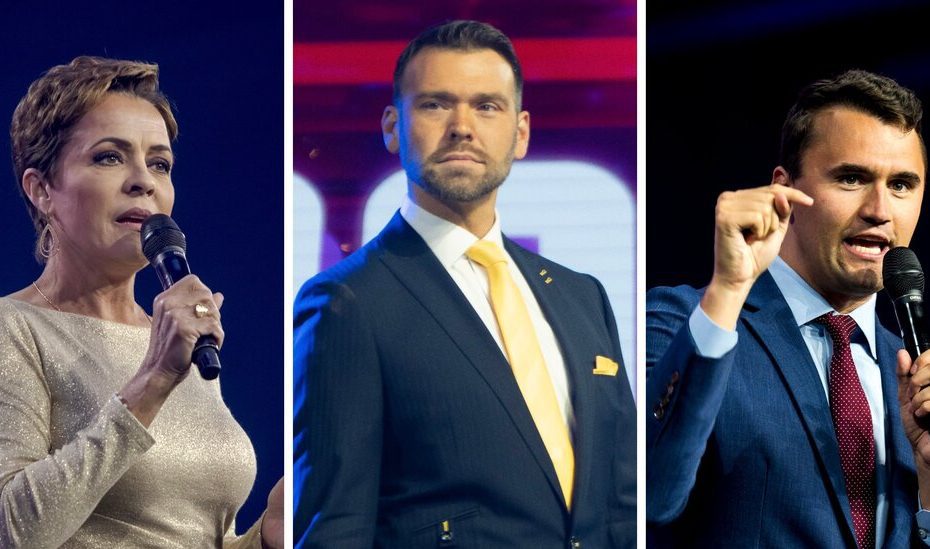News that the Trump government had agreed with Russia to try to negotiate a peace scheme for Ukraine, without including Ukraine in the conversations, was an revelation that many believed they have been reversing for many years of efforts to insulate Moscow.
But prominent voices in the right -wing media world interpreted the development this week as a reason for celebration.
“Every day a bit felt like Christmas morning, right?” Kari Lake, the former TV news anchor that is ready to run Voice of America, said during a podcast interview Tuesday. “President Trump wants peace for every nation.”
Charlie Kirk, the co-founder of Turning Point USA and Podcast-Gastheer who has more than 4.6 million followers on the social media platform X, praised the discussions as 'a relief'.
And Jack Posobiec, a die-hard Trump-Loyalist, perhaps best known for spreading the infamous “pizza-tagate” conspiracy theory, called in the title of the best-selling book by Mr. Trump. “Ladies and gentlemen,” he said on his podcast, “it's the art of the peace agreement.”
They belong to a growing pole of media figures who have been aligned by Trump that have become one of the toughest critics of the American strategy to tackle the Russian war in Ukraine, which waste the efforts of the Biden administration, harmful to national interests and ultimately meaningless consider. They have opposed the sending of more assistance to Ukraine, argued against the inclusion of the country in the North Atlantic Convention Organization and suggested that it would at least take part of the seized by Russia in the conflict.
Now that Mr. Trump is in charge again, many of the same right-wing voices have functioned as a supportive chorus, which made the unorthodox approach to the president to start directly with Russian leadership and to create a media story that is contrary to The deep unrest expressed by the deep unrest expressed by the institution for foreign policy.
The fact that increasing number of republicans is in accordance with this once surrounding conception is proof of Mr Trump's assets to bring his republican party about almost every issue, even one that increases his rather havelless attitude towards Russia. State Secretary Marco Rubio, who represents the United States during the conversations with Russia in Saudi Aarabia, was once a champion of Ukraine, although last year he as a senator voted against a congress help package that included Ukraine and that Mr. Trump resisted.
Mr. Trump campaigned on a promise to end the war in Ukraine and last week he pushed the business to the top of his agenda. On Wednesday he unveiled a surprise phone call with the Russian president, Vladimir V. Putin, who characterized Mr. Trump as the beginning of peace negotiations.
A day after the call, Tucker Carlson dedicated large parts of a live interview with President Viktor Orban van Hungary – himself a favorite of American law – to the war and the potential resolution.
“Donald Trump changed the mentality of the entire Western world,” Mr Orban told him.
Mr. Carlson, a former Fox News star who is now one of the most popular podcasters in the country, had long promoted pro-Russian arguments about his Fox Prime-time show, with the argument that President Volodymyr Zensky was a dictator which was used by the West, undermine Russia.
A year ago, Mr Carlson flew to Moscow to conduct a two-hour interview with Mr Putin, the first one-on-one session of the Russian president with a representative of a Western media in several years. Mr Carlson, who expressed sympathy for Mr Putin's position, criticized the US and European help to Ukraine, as well as the own administration of Ukraine, a center of his messages.
During his political career, Mr Trump has demonstrated that he is particularly receptive to that kind of comment, not only strengthens the views of his media supporters, but often acting in direct response to them.
Last week that dynamic seemed to reach new heights when Mr. Posobiec The Minister of Defense, Pete Hegseeth, accompanied during his trip to Germany, Belgium and Poland for a high level of security meetings. Mr. Posobiec took a chair on the front row on-Zo not an active role-in very sensitive diplomacy.
Mr. Posobiec is not a government official and did not travel as part of the press corps. Instead, he was invited by Pentagon officials and seemed to have apparently unobstructed access, allowing the influencer to comment on high-level conversations.
Mr. Posobiec then traveled with Minister of Finance Scott Bessent to Ukraine, where he met the Lord Zensky. Mr. Posobiec referred to the journey as 'the Trump Peace Delegation'.
Critics, including many veterans of the diplomatic corps, were alerted by the apparent rapprochement of Mr Trump with Russia. The conversations in Saudi Aarabia were an exhaustion of earlier American efforts to insulate Russia and impose sanctions on his political and financial leaders as a punishment for the 2022 invasion of Ukraine, which led to Europe's most destructive war in decades. Opponents also labeled the conversations as a potential danger for transatlantic alliances such as NATO.
Brit Hume, the most important political analyst of FOX News, sounded careful with caution about the negotiations. He speculated that the direct conversations between the United States and Russia were a precursor of a more inclusive round of negotiation, of which he thought it could eventually bring the parties together to find a solution.
“I don't think he's going to sell Ukraine,” said Mr. Hume about Mr Trump. “I think these early conversations in Saudi Arabia are just about the contours of the table, in all likelihood. And you can clearly not make any peace between two countries if you only negotiate with one. “

